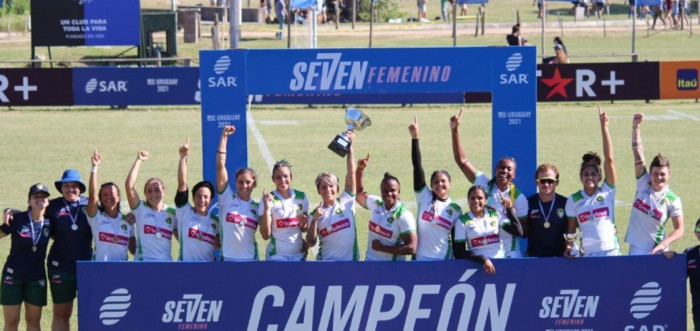Brazil, Colombia qualify for 7s World Cup
The first qualification tournament for the 2022 Sevens World Cup – the South American Championships – took place in Montevideo this weekend (12/13 November) with Brazil and Colombia winning the continent’s two places in Cape Town
Published by John Birch, November 13th, 2021
5 minute read

The dominance of Brazilian rugby in the South American sevens wrote saw them win their 20thtitle regional title, at the Carrasco Polo Club in Montevideo, Uruguay when they defeated Colombia 36-5 at the end of the 21st SAR 7s.
Brazil – The Yaras - clearly dominated the tournament, scoring 264 points, conceding only 31.
Bianca Silva, chosen Player of the Tournament, and Thalia Costa, who scored the most tries, breaking defences with ease thanks to the work of the rest of their teammates.
The South American representatives in the last two Olympic Games used the group stage matches to experiment in finding the best team. After four wins in a row, they were faced Paraguay, last year's finalists, for a place in the final – and at Cape Town.
Doubts about who would travel to South Africa quickly evaporated. After going into break leading 24-0, the final score of 57-0 saw a double hat-trick from the team's two sprinters, Costa and Silva.
On the other hand, came Colombia that had to fight a lot more to secure its place in Rugby World Cup Sevens. The “Tucanes” are the only other team to have won a South American title, when in 2015 they won the title in the absence of the Brazilians for qualifying for Rio 2016 (where Brazil had their place assured).
On the first day, Colombia defeated Chile 15-10, Peru 17-0 and it was only against Panama that they could show their open play, winning 63-0.
A 10-5 win against Paraguay secured the first place in their group, which avoided Brazil in the semi-finals, was a nervous game, but enough to get to the semi-final with Argentina.
That game for a place in RWC 7s was not for the faint of heart. After the try of Argentinian veteran Sofía González that she converted, Colombia scored through the experienced María Camila Lopera at the end of the first half.
González stretched the Argentinian lead to 14-5 with her second converted try. Colombia came back with a try from Leidy Soto under the posts but Tapia missed conversion.
Then with seconds remaining, Diosa for Colombia scored by the right flag to put her team up 15-14 with only a restart to go. Argentina had missed their last chance and Colombia will go to Rugby World Cup Sevens.
Argentina finished in third place by defeating the Paraguayans 24-5 while the hosts Uruguay defeated Chile 17-12 to celebrate fifth place and a remarkable growth over previous years. Peru was seventh, defeating Costa Rica 38-5. In the closing, Guatemala was able to celebrate by beating Panama 37-0.
The final confirmed that Brazilian dominance in the tournament from the start of the match. The experienced Raquel Kochhan saw a space in the Colombian defence for Thalia Costa to reach the ball first and the first try of the match.
Two minutes later, on the right wing, sprinters Bianca Silva and Thalia Costa exchanged the ball, scoring the second try.
The third came from a ball turned over 40 yards from the Colombian line and Mariana Nicolau taking advantage of the disrupted defence to score under the posts.
Costa's hattrick came again from turnover ball and with the advantage of one more player due to a Colombian yellow card, Silva escaped to leave Brazil ahead 27-0 at halftime.
The second half was with the same. From the start, Isadora Cerrullo cut close to her try line and ran 70 meters for Marcel Souza to support.
Leidy Soto, the best Colombian player, broke the Brazilian defence just two minutes from time giving a final score of 36-5.
Brazilian coach Will Broderick recognized the process that led his team to this double celebration. "The semi-final was the first time we were able to do what is practiced every day on the field."
“There were 12 players here, but there are 24 who are working in São Paulo. This is not new, it is a process that began five years ago. "